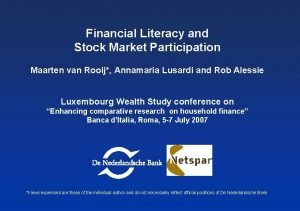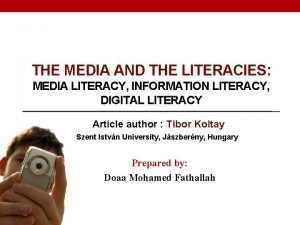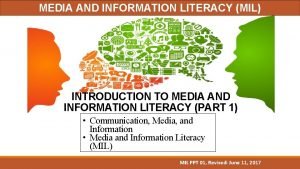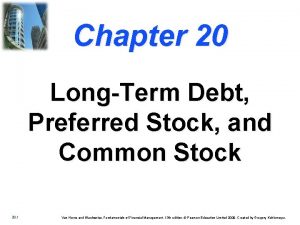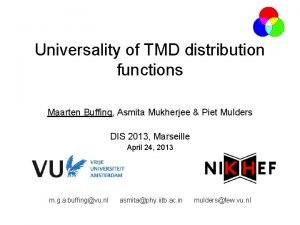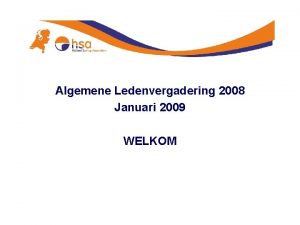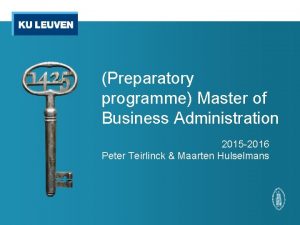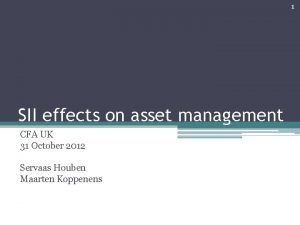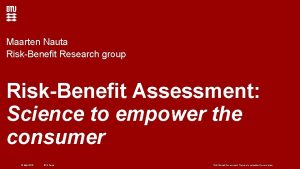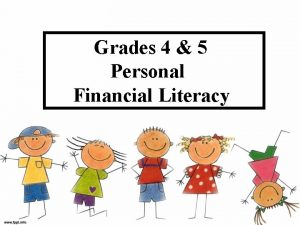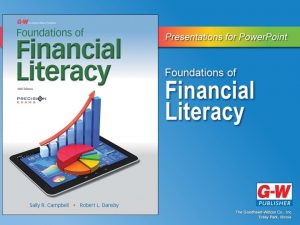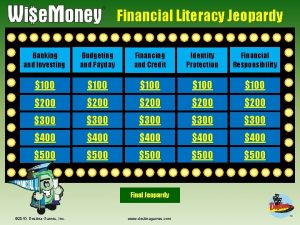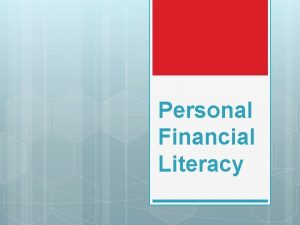Financial Literacy and Stock Market Participation Maarten van







































- Slides: 39

Financial Literacy and Stock Market Participation Maarten van Rooij*, Annamaria Lusardi and Rob Alessie Luxembourg Wealth Study conference on “Enhancing comparative research on household finance” Banca d’Italia, Roma, 5 -7 July 2007 *Views expressed are those of the individual author and do not necessarily reflect official positions of De Nederlandsche Bank

Relevance • Financial literacy has become increasingly important: Increased prosperity (higher participation in financial markets) Prevalence of increasingly complex financial products More individual responsibility: Shift from DB to DC pension plans and trend toward privatization of social security and pensions in many countries • Are individuals well-equipped to take responsibility for their financial well-being after retirement?

Results from DHS • Financial illiteracy is widespread. • Measurement of financial literacy is difficult; wording of questions is extremely important. • Financial literacy matters: Those with low literacy do not invest in stocks.

The Survey and the Financial Literacy Module • We have contacted 2, 028 households from the DHS (the respondent is the person who is mostly responsible for household financial administration). 1, 508 households responded, a response rate of 74%. • Internet survey • We have asked questions about current and past economic knowledge and education. • We use weights to correct for an overrepresentation of rich households. • Results can be combined with the DHS core data, a rich set of background information on demographics, employment, wealth and portfolio choice.

Our sample • Whole age range: 22 -90; mean age: 49. 6 • 51. 5% of respondents are male • 56. 8% are married/living with partner • 18. 4% are retired • 34. 5% have a college education (which includes vocational training) • 23. 8% own stocks or mutual funds (smaller sample for empirical estimates)

Measuring Basic Financial Literacy 1) Numeracy Suppose you had € 100 in a savings account and the interest rate was 2% per year. After 5 years, how much do you think you would have in the account if you left the money to grow: more than € 102, exactly € 102, less than € 102? 2) Interest compounding Suppose you had € 100 in a savings account and the interest rate is 20% per year and you never withdraw money or interest payments. After 5 years, how much would you have on this account in total: more than € 200, exactly € 200, less than € 200?

Measuring Basic Financial Literacy (cont. ) 3) Inflation Imagine that the interest rate on your savings account was 1% per year and inflation was 2% per year. After 1 year, would you be able to buy more than, exactly the same as, or less than today with the money in this account? 4) Time value of money Assume a friend inherits € 10, 000 today and his sibling inherits € 10, 000 3 years from now. Who is richer because of the inheritance: your friend, his sibling or are they equally rich? 5) Money illusion Suppose that in the year 2010, your income has doubled and prices of all goods have doubled too. In 2010, will you be able to buy more, the same or less than today with your income?

Basic Financial Literacy: Results Weighted percentages of total number of respondents (N=1, 508) ______________________________________ Numeracy Interest compounding Inflation Time value of money Money illusion ___________ _____ Correct 90. 8 76. 2 82. 6 72. 3 71. 8 Incorrect 5. 2 19. 6 8. 6 23. 0 24. 3 Do not know 3. 7 3. 8 8. 5 4. 3 3. 5 Refusal 0. 3 0. 4 ______________________________________ Note: Due to rounding columns may not sum up to 100

Basic Financial Literacy: Correct answers Number of correct financial literacy questions Weighted percentages of total number of respondents (N=1, 508) __________________________ Number of correct responses Percentage of respondents ________________________ None 2. 3 1 2. 8 2 6. 7 3 15. 1 4 32. 8 All 40. 2 __________________________ Note: Due to rounding columns may not sum up to 100

Advanced Financial Literacy Questions 1) Stock Risk Stocks are normally riskier than bonds. True or False? 2) Return Considering a long time period (for example 10 or 20 years), which asset normally gives the highest return: Savings accounts, Bonds or Stocks? 3) Volatility Normally, which asset displays the highest fluctuations over time: Savings accounts, Bonds or Stocks? 4) Company Stock Buying a company stock usually provides a safer return than a stock mutual fund. True or False?

Advanced Financial Literacy Questions (cont. ) 5) Diversification When an investor spreads his money among different assets, does the risk of losing money increase, decrease or stay the same? 6) Bond prices If the interest rates fall, what should happen to bond prices: rise, fall, or stay the same? 7) Bond maturity If you buy a 10 -year bond, it means you cannot sell it after 5 years without incurring a major penalty. True or false? 8) Definition of Bond Which of the following statements is correct? If someone buys a bond of Firm B: (i) He owns part of Firm B; (ii) He has lent money to Firm B; (iii) He is liable for Firm B’s debt; (iv) None of the above.

Advanced Financial Literacy Questions (cont. ) 9) Definition of stock Which of the following statements is correct? If someone buys the stock of firm B in the stock market: (i) He owns a part of firm B; (ii) He has lent money to firm B; (iii) He is liable for firm’s B debt; (iv) None of the above. 10) Functions of the stock market (i) It helps to predict stock earnings; (ii) It results in an increase in the price of stocks; (iii) It brings people who want to buy stocks together with people who want to sell stocks; (iv) None of the above. 11) Mutual funds (i) Once one invests in a mutual fund, one cannot withdraw money in the first year; (ii) Mutual funds can invest in several assets, for example invest in both bonds and stocks, (iii) Mutual funds pay a guaranteed rate of return that depends on their past performance; (iv) None of the above.

Advanced Literacy Questions: Results Weighted percentages of total number of respondents (N=1, 508) ____________________________ Stock Risk Company Stock Bond prices _________ Correct 60. 2 48. 2 24. 6 Incorrect 15. 1 24. 8 37. 1 Do not know 24. 3 26. 6 37. 5 0. 9 Refusal 0. 4 ____________________________

Randomization: Stock Risk

Randomization: Company Stock

Randomization: Bond Prices

Financial Literacy Indexes • • • We summarize the information on the basic and advanced literacy questions using factor analysis. Two indexes: basic and advanced literacy We find that literacy is low among: those with low education women Literacy indexes are highly correlated with selfassessed literacy

Advanced Literacy Across Demographics N = 1, 508 Advanced literacy quartiles Education 1 2 3 4 Mean N ____________ ____ ___ Primary 48. 3 24. 7 17. 5 9. 5 1. 88 67 Preparatory intermediate voc. 35. 1 29. 4 23. 5 12. 0 2. 12 345 Intermediate vocational 32. 8 23. 9 26. 3 17. 0 2. 28 294 Secondary pre-university 19. 0 21. 8 28. 4 30. 9 2. 71 207 Higher vocational 14. 6 23. 7 25. 1 36. 7 2. 84 397 University 6. 0 24. 7 26. 0 43. 4 3. 07 197 Pearson chi 2(15) = 149. 32 (p=0. 0 00) Gender 1 2 3 4 Mean N Male 15. 9 20. 2 26. 7 37. 2 2. 85 834 Female 34. 5 30. 2 23. 3 12. 13 674 Pearson chi 2(3) = 161. 53 Note: percentages may not sum up to 100 due to rounding. (p= 0. 000)

Self-assessed literacy How would you assess your understanding of economics ? 7 -point scale (1 -7) where 1 means very low and 7 means very high

Self-assessed versus objective literacy Advanced literacy quartiles ________________ Self-assessed literacy 1 2 3 4 Mean N ______ ____ __ 1 (very low) 55. 3 9. 4 27. 1 8. 2 1. 88 9 2. 24. 9 34. 9 22. 2 18. 0 2. 33 56 3 29. 2 31. 8 28. 1 10. 9 2. 21 137 4 31. 3 27. 5 23. 2 18. 0 2. 28 366 5 21. 7 28. 1 25. 8 24. 4 2. 53 499 6 15. 9 15. 6 26. 1 42. 4 2. 95 355 7 (very high) 3. 9 10. 2 34. 8 51. 1 3. 33 45 Do not know 66. 1 18. 3 8. 6 7. 0 1. 56 31 Refusal 67. 5 24. 9 7. 6 0. 0 1. 40 10 Pearson chi 2(24) = 189. 19 (p= 0. 000)

Does Financial Literacy Matter? • We first investigate whether financial literacy is correlated with sources of financial advice • We then investigate whether financial literacy prevents people from investing in stocks.

Sources of Financial Advice • We find that financial literacy is correlated with the most important source of financial advice for making financial decisions: Those with low literacy are more likely to consult family and friends. Those with high literacy are more likely to read newspapers, magazines, books and rely on financial advisors.

Sources of Financial Advice Advanced literacy quartiles 1 st 2 nd 3 rd 4 th 40. 7 37. 4 19. 9 17. 9 Information from newspapers 1. 1 6. 0 10. 6 13. 7 Financial magazines, books 2. 1 7. 6 9. 7 17. 0 Brochures from my bank 6. 6 6. 7 11. 3 6. 2 Advertisement on TV 4. 0 3. 6 5. 0 1. 4 Professional advisers 19. 4 23. 6 27. 5 24. 1 Fin. Computer programs 0. 2 0. 3 1. 1 0. 5 Fin. Information on Internet 6. 3 6. 6 7. 6 12. 4 Other 19. 7 8. 2 7. 3 6. 9 Parents, friends, acquaintances

Stock-holding puzzle • It is a puzzle why so many households do not own stocks. • Possible explanations include risk aversion, background risk, liquidity constraints, participation costs, departures from utility maximization (e. g. asset ignorance, cognition, trust). • They help to explain the puzzle, but do not solve the puzzle on their own. However, they give rise to fixed costs that shy away potential small investors from entering the stock market. • Limited financial literacy adds to the list as it raises the costs of entry and making optimal use of the ‘equity premium’.

Financial Literacy and Stock Market Participation • We investigate whethere is a causal relationship between financial literacy and stock market participation. • We insert basic literacy as a control for cognitive ability. • • Estimation: Reverse causality Measurement error We use an Instrumental Variables approach.

Instrumental Variables estimation Instrument for advanced literacy index: How much of your education was devoted to economics? (i) A lot; (ii) Some; (iii) Little; (iv) Hardly at all First stage regression • Very high predictive power Over-identification test not rejected

Stock market participation: OLS and IV estimates N = 1, 115 Adv. Literacy OLS IV IV 0. 089*** (0. 012) 0. 083*** (0. 012) 0. 155*** (0. 057) 0. 163*** (0. 069) Basic Literacy Demographics 0. 011 (0. 010) yes -0. 0138 (0. 023) yes F value 1 st st 22. 15 19. 71 Hansen J test (p value) 0. 672 0. 673 Exogeneity test (p value) 0. 227 0. 236

Extensions • Use self-assessed literacy in lieu of measured literacy

Stock market participation: Self-assessed literacy N = 1, 083 Self-assess. literacy Basic literacy Demographics OLS IV 0. 063*** (0. 012) 0. 033*** (0. 011) yes 0. 091** (0. 038) 0. 0288** (0. 012) yes F value 1 st stage 37. 99 Hansen J test 0. 624 Exogeneity test 0. 424

Extensions ü Self-assessed literacy • Exclude randomized questions • • Less measurement error Fewer questions about stocks

Stock market participation: Different literacy index N = 1, 115 Adv. Literacy OLS IV IV 0. 082*** (0. 012) 0. 077*** (0. 012) 0. 166*** (0. 062) 0. 182*** (0. 078) Basic Literacy Demographics 0. 011 (0. 010) yes -0. 024 (0. 028) yes F value 1 st st 19. 07 16. 15 Hansen J test 0. 682 0. 684 Exogeneity test 0. 156 0. 163

Extensions ü Self-assessed literacy ü Exclude randomized questions • Literacy or cognition? • Exploit questions in the 2 nd module Two economic changes in the Netherlands: (1) Conversion to the Euro (2) New health insurance system

Stock market participation: Literacy or cognition? N = 1, 053 Advanced literacy Difficulty converting to Euro Demographics OLS IV 0. 085*** (0. 012) yes 0. 141** (0. 061) yes yes F value 1 st stage 18. 37 Hansen J test 0. 960 Exogeneity test 0. 343

Stock market participation: Literacy or cognition? N = 1, 053 Advanced literacy Difficulty with new health system Demographics OLS IV 0. 088*** (0. 012) yes 0. 156** (0. 065) yes yes F value 1 st stage 17. 27 Hansen J test 0. 970 Exogeneity test 0. 280

Extensions ü Self-assessed literacy ü Exclude randomized questions ü Literacy or cognition? • Estimates across different age groups • Reverse causality is weakened • Stronger instruments: Financial education in school may become obsolete with age

Stock market participation: Age Groups N = 320 (age <40), 566 (age <50) Age < 40 OLS Age <40 IV Age<50 OLS Age <50 IV Adv. Literacy 0. 079*** (0. 019) 0. 135* (0. 076) 0. 077*** (0. 016) 0. 211*** (0. 081) Basic Literacy -0. 002 (0. 019) -0. 022 (0. 031) 0. 008 (0. 015) -0. 039 (0. 031) Demographics yes yes F value 1 st st 10. 34 13. 46 Hansen J test 0. 462 0. 703 Exogeneity test 0. 431 0. 075

Other extensions • Include a measure of risk aversion Results do not change • Tried other instruments: Education from parents Have little predictive power for advanced literacy: Consistent with the fact that economic conditions have changed across generations (cannot learn much from parents). • Include education level of social network Results do not change

Summary: Takeaway points • Widespread lack of financial literacy Financial literacy should not be taken for granted. • Measurement of financial literacy is not trivial Large differences warrant a careful survey design. • Financial literacy matters Our estimates indicate that literacy does have an effect on stock market participation.

 Financial literacy and stock market participation
Financial literacy and stock market participation Contoh lrs
Contoh lrs Dr van ginderachter
Dr van ginderachter Maarten van schijndel
Maarten van schijndel International segmentation
International segmentation Media literacy and information literacy similarities
Media literacy and information literacy similarities Medium in mil
Medium in mil Who are the people in media
Who are the people in media Cyber literacy for the digital age
Cyber literacy for the digital age Leader challenger follower
Leader challenger follower Features of preferred stock
Features of preferred stock Characteristics of common stock and preferred stock
Characteristics of common stock and preferred stock Financial literacy and education commission
Financial literacy and education commission Maarten buffing
Maarten buffing Nelleke arnout
Nelleke arnout Diabete gestationnel
Diabete gestationnel Maarten kremers
Maarten kremers Maarten rijssenbeek
Maarten rijssenbeek Marc ophalvens
Marc ophalvens Maarten thiry
Maarten thiry Maarten hageman
Maarten hageman Maarten worp
Maarten worp Maarten vissers
Maarten vissers Maarten groothuis
Maarten groothuis Maarten pennings
Maarten pennings Maarten koppenens
Maarten koppenens Maarten nauta
Maarten nauta Opzet presentatie
Opzet presentatie Maarten den ottolander
Maarten den ottolander Macam macam stock
Macam macam stock Stock final de marchandises
Stock final de marchandises Stock market crash def
Stock market crash def Bhartiya model of financial literacy
Bhartiya model of financial literacy Maths lit tariffs grade 12
Maths lit tariffs grade 12 Finance maths lit grade 10
Finance maths lit grade 10 5th grade financial literacy teks
5th grade financial literacy teks Chapter 1 financial literacy basics answer key
Chapter 1 financial literacy basics answer key Smart goals financial literacy
Smart goals financial literacy Financial literacy jeopardy
Financial literacy jeopardy Pshe financial literacy
Pshe financial literacy
